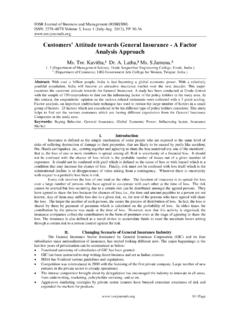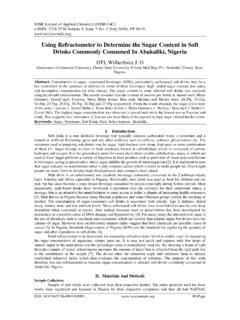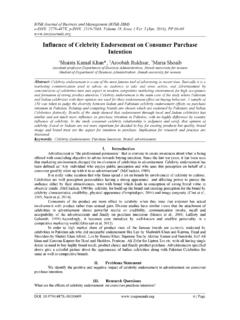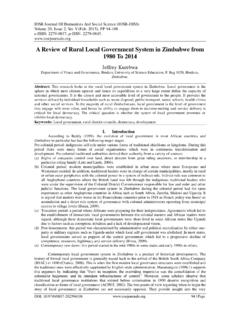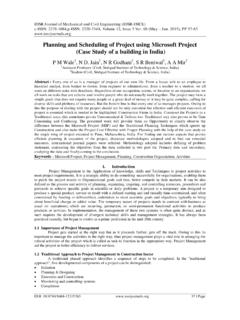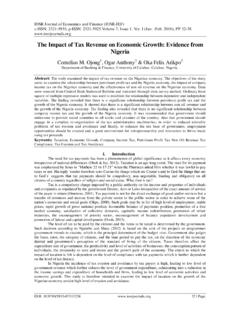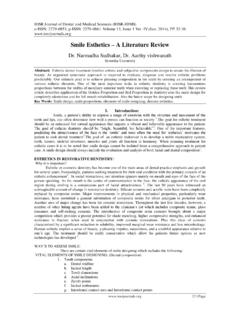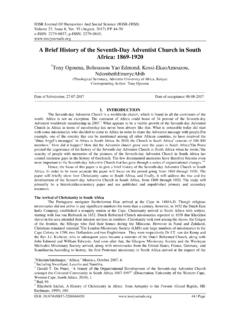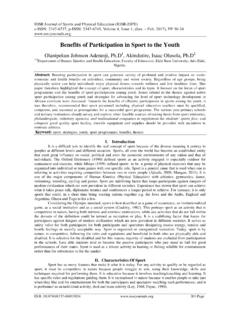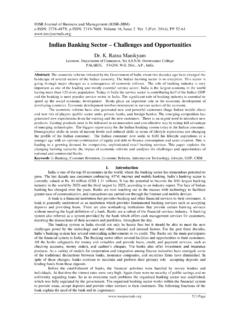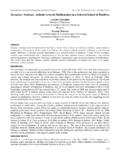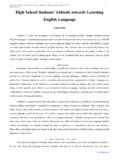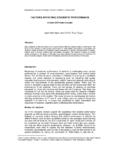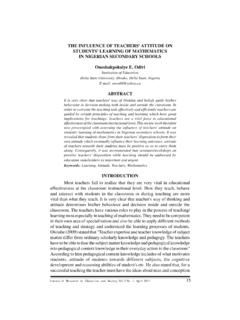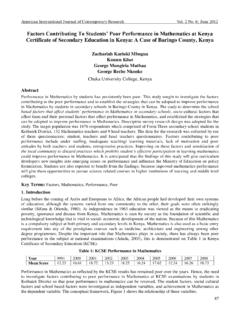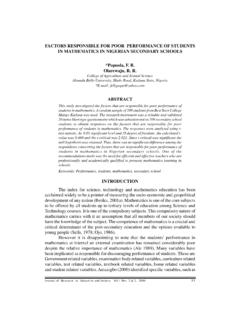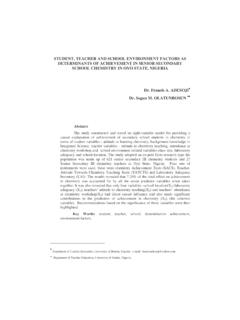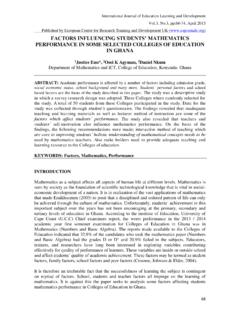Transcription of Gender and Teacher Influence on Students’ attitude …
1 IOSR Journal Of Humanities And Social Science (IOSR-JHSS) Volume 20, Issue 4, Ver. IV (Apr. 2015), PP 26-31 e-ISSN: 2279-0837, p-ISSN: 2279-0845. DOI: 26 | Page Gender and Teacher Influence on students attitude towards Dr. Felistas Chemutai Moi University PO BOX 4755, ELDORET Abstract: The role of the Teacher and Gender on students attitude towards the subjects done in school including is important as a way of improving performance in examinations. This paper examines how Gender based opinions and teachers Influence students attitudes towards Christian Religious Education (henceforth, CRE) in secondary schools in Kenya and how these reflect on the performance in the subject.
2 The study uses questionnaires which consist of both close and open-ended items. The close ended items have statements each rated on a 5-point Likert scale ranging from Strongly Agree to Strongly Disagree. It is notable that the more positive the learners attitude is, the better the performance. On the contrary, Gender Influence have the least impact as the majority of the learners evenly distributed across the various achievement brackets thought it had no impact on the choice of at all. Keywords: Teacher Influence , Gender Influence , attitude , Performance, Christian Religious Education I. Introduction A person's Gender -role attitudes reflect beliefs about the roles of men and women. These attitudes define the kinds of things that are acceptable or appropriate for men to engage in but not women, and vice versa.
3 For example, people vary in the degree to which they endorse the idea that women should be just as able to do science oriented subjects as equals with men or even better. Conversely there is also variation in opinion as to whether humanities and social sciences like religious education are meant for women and not men. Such Gender based attitudes have an Influence on students attitudes towards certain subjects, and in the long run may Influence performance in these subjects. In addition, attitudes towards certain subjects may also be influenced by the Teacher teaching such subjects. This paper examines how Gender based opinions and teachers Influence students attitudes towards Christian Religious Education (henceforth, CRE) in secondary schools in Kenya.
4 II. Gender and attitude The relationship between Gender and attitudes is in no way straight forward. Several studies done reveal mixed results. A survey conducted by the American Association of university women referred to as AAUW(1992) revealed that as girls grow, they lose confidence in their abilities, expect less from life and lose interest in challenging courses of study and rewarding careers particularly pursuits involving mathematics and science. Atkinson (1979) carried out a study on factors influencing attitudes of black college freshmen and found that the sex of a student was not related to their attitudes . Similar sentiments were expressed by Edward (1973) who found no difference in the attitudes of male and female college students towards mathematics.
5 The Teacher , Gender and other determinants of attitude It has been established that boys and girls experience schooling differently and are treated differently by teachers depending on whether they are girls or boys. Research has shown that the interactions between teachers and boys and between teachers and girls vary in frequency, duration and content. Consequently, boys and girls develop different perceptions of their abilities and relationships (Gipps et al, 1994). This poses a challenge to teachers especially in mixed schools. Teachers ought to treat both boys and girls equally so that none feels better than the other in academic performance. Further, mode of socialization leads girls and boys to develop different attitudes to certain academic disciplines.
6 It is hypothesized that negative attitudes will Influence whether students will feel able to engage with certain tasks and the subsequent quality of their engagement. The prediction is that negative attitudes will result in lower performance. This concurs with the theory of reasoned action (Ajzen & Fishbein, 1980). Another related hypothesis (Gipps et al, 1994) concerns students perceptions of the value of certain subjects for themselves and their future lives. Boys tend to see maths and science as important for their future careers. Both boys and girls equally agree that these subjects are of less value for girls lives and careers. Such perceptions affect students motivation which will in turn Influence their engagement in domain specific tasks.
7 The Gender and Teacher Influence on students attitude towards DOI: 27 | Page predicted consequence is that students performance may be affected and their potential learning either limited or enhanced depending on their view of the appropriateness of the activities they are expected to engage in. The findings of this study revealed that boys and girls consider to be a subject that is important for their future lives. Similar studies have revealed that there is a correlation between attitude and performance. The different attitudes of boys and girls as groups to subjects or aspects of subjects reflect pupils learnt behaviours about their own capabilities and what constitutes appropriate behaviour for them.
8 These different attitudes alter pupils level of confidence, which in turn influences their performance. attitudes can also Influence what pupils see as significant in tasks, which depending on their Gender and the image of the subject can focus them onto the task at hand or lead them to perceive an alternative task or no task at all. The effect of different attitudes can therefore enhance or depress performance on a task irrespective of achievement. Owiti s (2001) study on Gender difference in attitude towards mathematics in Eldoret Municipality showed that there is a significant relationship between student s Gender and their attitudes towards Mathematics. He also established that parental view on maths influenced students ' attitudes towards maths.
9 Children go to school with learning styles already developed, some of which are not different from those advocated in various subjects but incompatible with them (Cohen 1986). The people that pupils interact with can Influence their attitude towards certain subjects. Bray et al (1986) noted that schools may have hidden biases in the subjects which boys and girls are encouraged to study. An international study based on six countries revealed that secondary girls tend to be steered into such subjects as domestic science and to aspire to home duties and low status jobs rather than paid employment and high status jobs. III. The Teacher s Role and Influence The Teacher has a role to play in the teaching and learning of This is because the student considers the Teacher to be a role model.
10 Therefore the Teacher should be a motivator, speak with conviction and be able to evaluate what he has taught. He/she should be a role model and manager of student behaviour. The Teacher should love to teach and not just teach for money. Some qualities that should be portrayed on the part of the Teacher are devotion, commitment, imagination, creativity, confidence, caution and wisdom. This is because teaching is a challenging undertaking since it involves the Teacher inspiring pupils towards proper moral behaviour (Malusu & Otiende, 1994). Teachers ought to realize that being a good role model to students contributes to some extent in enabling students have a favourable attitude towards Professionally, the Teacher should be trained, inspired and must attend seminars.
